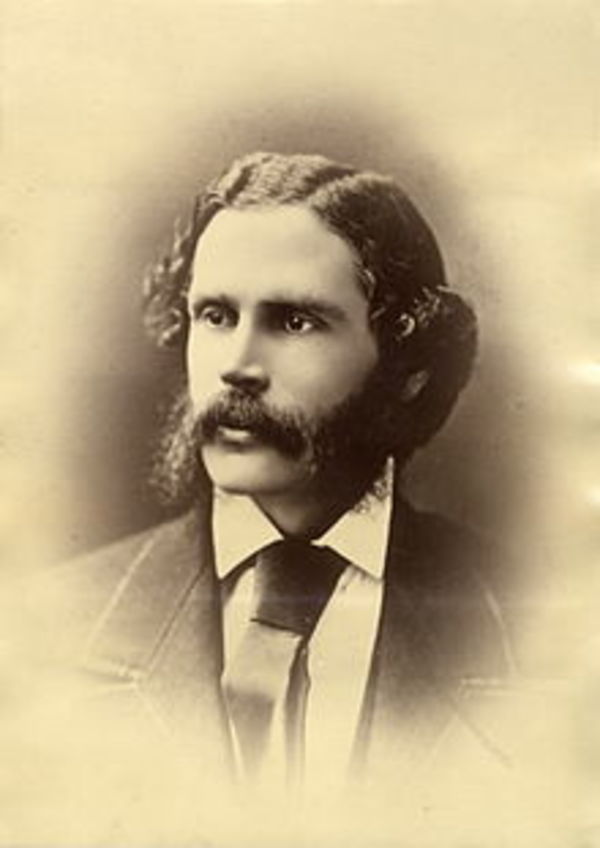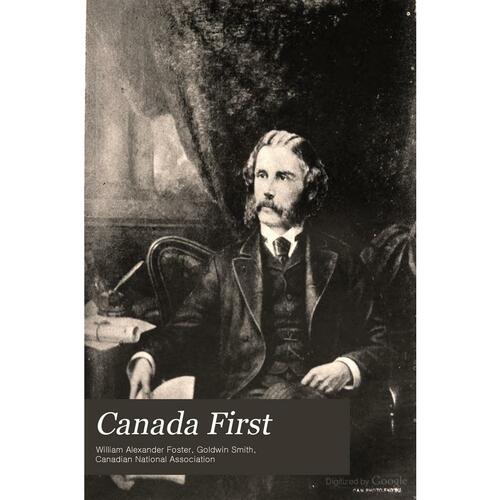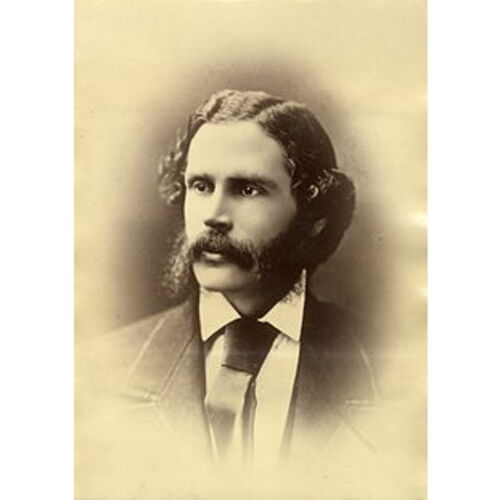
Source: Courtesy of Wikimedia Commons
FOSTER, WILLIAM ALEXANDER, barrister and essayist; b. 16 July 1840 at Toronto, Upper Canada, son of James Foster and Mary Morrison; m. in 1877 Margaret, daughter of John George Bowes*; d. 1 Nov. 1888 at Toronto, survived by two children.
William Alexander Foster remains a somewhat enigmatic figure in Canadian history although many of his contemporaries and some modern scholars share the opinion that he was a man of great intellectual capacity whose political ideas contributed to the definition of liberal nationalism in Canada. He was educated at the Toronto Academy and at the University of Toronto where he received an llb in 1860. After articling with Adam Wilson*, he was called to the bar in 1861. In 1867 Foster formed a partnership with Caleb E. English; John Roaf, qc, joined the firm in 1870. The following year Foster became a partner of Thomas Moss and Featherston Osler and from 1872 to 1875 worked with them in the firm of Harrison, Osler and Moss. Foster also devoted much energy to his duties as a member of the senate of the University of Toronto. As a writer he contributed to two London papers, the Westminster Review and the Times, as well as to several in Toronto, the Daily Telegraph, the Canadian Monthly and National Review, the Grumbler, and the Monetary Times; he was a founder of this last paper in 1867 and its editor.
Foster’s name is most frequently associated with the Canada First movement. Self-consciously patriotic in its defence of political purity in the wake of the Pacific Scandal in 1874, of national self-interest and equality within the British empire in the aftermath of the negotiations which led to the Treaty of Washington in 1871, and of a distinctly Canadian interpretation of the history and national character of Canadians in the first blush of the confederation experiment, Canada First gave the appearance of marking the initial incursion of young, urbane, liberal intellectuals into the mainstream of Canadian political development. But the public movement had evolved out of more secret, even clandestine activities of a group of young men which had, in contrast with the gentler aspirations and pronouncements of Canada First, been part of Ontario’s hysterical reaction to the Red River uprising of 1869–70 led by Louis Riel.
Foster and four or five of his friends had idolized Thomas D’Arcy McGee*’s perception of the new Canadian nation, as found in his writing and political stance from the late 1850s until his death in 1868, and they agreed to use their talents, collectively or individually, to promote the goals of confederation. This group included Henry James Morgan*, Charles Mair*, George Taylor Denison* III, and Robert Grant Haliburton*. Each had particular interests: Morgan, a biographer, collected facts about prominent Canadian public men; Mair, a poet, was an enthusiast on behalf of Canadian literature; Denison, lawyer and cavalry officer, wrote extensively on national defence; Haliburton, a Nova Scotian essayist and businessman, was interested in the effects of environment on the shaping of national character; Foster had written extensively and perceptively on the economic background and purpose of confederation. In two articles prepared for the Westminster Review in 1865 and 1866 Foster convincingly argued that the political and economic cohesion and interdependence imposed upon the British North American colonies by their common geography would, with the growth of population, guarantee their independence as a nation in spite of Britain’s waning presence and the need for their continued economic cooperation with the United States.
The “old five of the corner room” – Morgan’s rooms in an Ottawa hotel – met in the nation’s capital in the spring of 1868. Haliburton was in Ottawa to confer with McGee on the government’s policy toward the Nova Scotia coal industry. Denison was lobbying for the post of assistant adjutant-general of cavalry. Mair was doing research for the government connected with the annexation of the Hudson’s Bay Company lands in the northwest. Morgan, a career civil servant, introduced Foster and Denison, the Torontonians, to Mair and Haliburton, and the five became fast friends who shared a mutual interest not only in the great political issues of the day but in the somewhat more sophomoric pursuits of young comrades on the loose in a strange city. “Chamber maids . . . orgies! Oh me!” Foster protested when reminded later of their eclectic interests. What cemented their friendship, however, was their mutual concern for both the pace of Canada’s development as a nation and the quality of its national life defined in terms of the attributes of nationalism, especially a national identity. In these matters they took their lead from McGee’s romantic vision of a new nationality destined to rival both its neighbour to the south and its British parent by virtue of the superior moral fibre and intellectual vigour of its young men.
The informal programme of lectures and essays sponsored by the group was set aside in favour of more direct action when the people of the Red River area resisted unilateral annexation of Rupert’s Land to the dominion in 1869. Mair, who was serving at the time as accountant and paymaster of a Canadian government survey crew in Red River, eluded capture by the Métis, and with Dr John Christian Schultz*, the leader of the Canadian party in Red River, made his way to Toronto. Foster and Denison, who had corresponded continuously with Mair, had augmented the group with new members, creating the “Twelve Apostles.” They arranged the public meetings and disseminated much of the propaganda which in Ontario lionized Mair and Schultz as heroes and vilified the Métis who had executed Thomas Scott* by depicting them as relics of a medieval society whose values were inconsistent with and inimical to the goals of confederation. Foster’s role in these events is not precisely clear, but there is evidence to suggest that in conjunction with George Roden Kingsmill, an editor and one of the “Apostles,” he penned the editorials in the Daily Telegraph which announced the news of Scott’s death to Torontonians and demanded that the government deal peremptorily and harshly with the “few hundred dirty, ignorant, miserable half-breeds” who had defied Canadian authority. In effect, the “Apostles” defended the Upper Canadian contention that Manitoba was Ontario’s frontier and that one of the purposes of confederation was to ensure that Ontario’s territorial ambitions were realized. To reinforce this defence, in the summer of 1870 the “Apostles” created the North West Emigration Aid Society. Ostensibly the society existed to offer advice to intending emigrants about the climate, topography, and agricultural potential of Manitoba, about the availability of land, and about travel arrangements and required gear. In fact, they made a pamphlet available on request, but its technical contents barely disguised the society’s express purpose of promoting an unarmed invasion of Manitoba by anglophone settlers who would soon submerge the Métis population. No evidence about the society’s success survives, and in any case events quickly propelled the attentions of the “Apostles” toward yet another crisis of nationality.
In 1871 the Manitoba crisis gave way to the events surrounding the negotiations for the Treaty of Washington during which Britain, anxious to cement relations with the United States after the animosity generated during the Civil War, forced the Canadian government to accept a treaty that was harmful to its interests. Foster responded with a pamphlet entitled Canada First; or, our new nationality. He defended the proposition that the imperial relationship had to be redefined in terms of equality among nations. This development, he argued, presupposed two others: that Canadians had to embrace their new nationality with a patriotism which effectively demonstrated that national pride had replaced colonial inferiority and that the idea of a Canadian national sentiment had form and substance which distinguished it from colonial loyalties. Conversely, Britain had to recognize the existence of these feelings, and their basis in fact, before dependence could give way to equality. In Foster’s opinion, the process of developing a national sentiment would be a slow one because of the new nation’s racial, religious, and political diversity which tended to promote disunity and disharmony. But he maintained, using a concept borrowed from Haliburton, that a common nationality inevitably would evolve out of contact with the northern environment which all Canadians shared and which would make them the “northmen of the New World.”
Both the title and the patriotic sentiments of Foster’s pamphlet became the watchwords of a formal political movement which emerged in Toronto in the wake of the Pacific Scandal. Led by Foster and Goldwin Smith*, a group of political activists including many former “Apostles” decided to test the strength of a new party in Canadian politics, a party ostensibly more “nationalistic” than the older parties which they accused of self-interest. Smith was to be the Canada First party’s candidate in the Toronto West by-election held in December 1873, but he was in England at the time of the nomination meeting and the Canada Firsters endorsed the Liberal candidate for the riding, Foster’s law partner, Thomas Moss, who was victorious.
The Canada First party subsequently was subjected to a great deal of ridicule by the national press, and Foster therefore took it upon himself to establish the party on a firm basis by creating in 1874 the Canadian National Association with its own headquarters, the National Club, and its own journal, the Nation. Foster was also the author of the association’s manifesto, a programme consisting of 11 points concerned with political reform, economic development, and external relations, which seemed to foreshadow, in some respects, the later National Policy of Sir John A. Macdonald*. For example, the manifesto called for a national policy of protective tariffs to encourage industrial growth and the establishment of a system of free homesteads in the public domain to encourage immigration. Similarly, the association’s call for the introduction of the secret ballot anticipated one of Prime Minister Alexander Mackenzie*’s important political reforms. The association also advocated the representation of political minorities who went unrepresented in parliament because they were unable to elect spokesmen through the usual democratic processes: an idea which became somewhat more current during the third party protest movements of the next century. But the remainder of the planks were at best platitudinous, at worst vacuous. Compulsory voting, reorganization of the Senate, abolition of the property qualification for members of the House of Commons, and an income franchise were all intended as liberal democratic antidotes to what the Canada Firsters regarded as a political system too susceptible to abuses of power and privilege. The association, however, never detailed how it proposed to implement these reforms. “Pure and economic administration of public affairs,” the 11th point of the platform, was clearly intended to distinguish the new association from the evidently corrupt older parties, especially the Liberal-Conservatives. But it was this plank more than any of the others which opened the platform to the resounding ridicule of the partisan press who correctly pointed out that honesty, economy, and patriotism were every politician’s stock-in-trade and that for one party to claim to have a monopoly on these virtues was evidence of political simple-mindedness.
To Foster’s chagrin, the platform of the Canadian National Association attracted attention from all the wrong quarters. The newspapers tore it to pieces; but worse, Edward Blake*, the theoretician of the Liberal party, publicly embraced and embellished some of the association’s positions in an address at Aurora in October 1874, leaving the movement with neither a platform nor a constituency. The Nation ceased publication in 1876, and the National Club’s political function was swiftly replaced by a social one. After the collapse of the Canada First movement, Foster devoted himself to his law practice. Working alone initially, in 1877 he formed a partnership with James B. Clarke and in 1882 his brother-in-law, Robert H. Bowes, joined the firm. Foster was commissioned a qc on 26 Oct. 1885.
Foster’s death in 1888 marked the beginning of the debate over the importance of the Canada First movement. Schultz, Denison, Mair, Haliburton, and Morgan saw Canada First’s importance, and Foster’s contribution to it, in terms of the secretive, aggressively nationalistic phase of the “Apostles”‘ activities before 1873. Goldwin Smith, and the later supporters of the party, eulogized Foster as the “animating spirit” of an intellectual movement pledged to “elevate the character of a nation” through its lofty principles of liberal nationalism. Until recently, the latter interpretation has predominated among historians, perhaps as a reflection of scholarly preoccupation with the search for a Canadian identity, a search in which the Canadian National Association has appeared as an obvious beacon on an uncharted horizon. Canada First has also been explained as a genuine third-party movement. The current consensus, however, is that the Canada Firsters were Canadian “imperialists” whose actions and attitudes reflected the hopes and frustrations of the national quest for power, status, and security inherent in the process of confederation but rooted in the entire Canadian historical experience.
Of all the men involved in the Canada First movement, Foster was the least public personality and perhaps the most original intellect. He is known almost solely on the basis of his published essays which characterize him as a perceptive commentator whose clarity, insight, and judgement were frequently clouded by vague and unduly romanticized intimations of the political possibilities of a national volksgeist.
Essays by William Alexander Foster are contained in Canada First: a memorial of the late William A. Foster, Q.C., intro. Goldwin Smith (Toronto, 1890). The volume includes Foster’s Canada First; or, our new nationality; an address, originally published in 1871 at Toronto.
AO, MU 1058. “Canada First movement: scrapbook of clippings relating to that movement and to its founder and leader William Alexander Foster” (Canadian Library Assoc. mfm. project, 1956). MTL, Denison family papers. PAC, MG 29, D61; E29. QUA, Charles Mair papers. Daily Telegraph (Toronto), 4–11 April 1870. Globe, 2 Nov. 1888. Commemorative biog. record, county York. Carl Berger, The sense of power; studies in the ideas of Canadian imperialism, 1867–1914 (Toronto and Buffalo, N.Y., 1970). G. T. Denison, The struggle for imperial unity; recollections & experiences (Toronto and London, 1909). D. P. Gagan, The Denison family of Toronto, 1792–1925 (Toronto, 1973). [F.] N. Shrive, Charles Mair, literary nationalist (Toronto, 1965). F. H. Underhill, The image of confederation (Toronto, 1964; repr. 1967, 1973). W. S. Wallace, The growth of Canadian national feeling (Toronto, 1927). D. P. Gagan, “The relevance of ‘Canada First,’” Journal of Canadian Studies, 5 (1970), no.4: 36–44. G. M. Houghman, “Canada First: a minor party in microcosm,” Canadian Journal of Economics and Political Science (Toronto), 19 (1953): 174–84.
Cite This Article
David Gagan, “FOSTER, WILLIAM ALEXANDER,” in Dictionary of Canadian Biography, vol. 11, University of Toronto/Université Laval, 2003–, accessed December 20, 2025, https://www.biographi.ca/en/bio/foster_william_alexander_11E.html.
The citation above shows the format for footnotes and endnotes according to the Chicago manual of style (16th edition). Information to be used in other citation formats:
| Permalink: | https://www.biographi.ca/en/bio/foster_william_alexander_11E.html |
| Author of Article: | David Gagan |
| Title of Article: | FOSTER, WILLIAM ALEXANDER |
| Publication Name: | Dictionary of Canadian Biography, vol. 11 |
| Publisher: | University of Toronto/Université Laval |
| Year of publication: | 1982 |
| Year of revision: | 1982 |
| Access Date: | December 20, 2025 |




